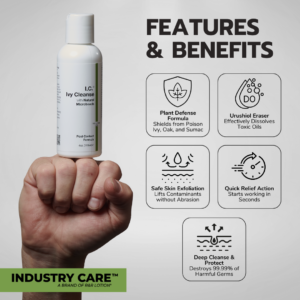Is Cold or Hot Water More Effective for Washing Off Poison Ivy?
By: Richard Rich
Introduction
Outdoor work environments often pose the risk of exposure to poison ivy, leading to the uncomfortable and sometimes severe rash caused by the plant’s oily resin, urushiol. Understanding the correct methods for treating poison ivy exposure is crucial for safety managers and outdoor workers to minimize discomfort and prevent the rash from worsening. This article explores the debate surrounding the use of hot water for poison ivy relief and offers guidance on effective treatment strategies, highlighting R&R Lotion’s I.C. Ivy Cleanse and I.C. Ivy Block products.
Identifying Poison Ivy Rash
Recognizing the signs of poison ivy rash is the first step in effective management. The rash typically appears as red, itchy bumps or blisters, often in a streaky pattern, accompanied by swelling. Immediate recognition and treatment are key to managing symptoms and preventing the spread of the rash, which can be exacerbated by scratching or inadequate cleaning.
The Debate: Hot Water for Poison Ivy Rash
There is a common misconception that hot water can relieve the symptoms of poison ivy rash. While hot water might initially feel soothing, it can actually aggravate the condition. The heat stimulates the release of histamine, which can temporarily reduce itching but also increases inflammation and irritation over time.
Why Hot Water Is Discouraged
The primary concern with using hot water is that it opens the pores, potentially allowing more urushiol to penetrate deeper into the skin, worsening the rash. Additionally, hot water can strip away natural oils that help protect the skin, leading to increased dryness and irritation.
Effective Treatment Strategies
The best immediate response to poison ivy exposure involves:
Rinsing with Cool Water: Using cool water helps remove urushiol from the skin without opening pores. This method helps to reduce inflammation and closes the pores, minimizing further absorption of the irritant.
Cleansing with Specialized Products: Products like R&R Lotion’s I.C. Ivy Cleanse are specifically formulated to effectively remove urushiol from the skin, tools, and clothing, reducing the risk of rash development or spread.
Using a Barrier Cream: I.C. Ivy Block by R&R Lotion provides a protective barrier that prevents urushiol from coming into contact with the skin, ideal for those who are frequently exposed to environments where poison ivy is present.
The Role of Safety Managers
Safety managers should ensure that outdoor workers are well-informed about the risks of poison ivy and trained in proper first-response actions following exposure. Implementing routine safety briefings and supplying workers with effective products like I.C. Ivy Cleanse and I.C. Ivy Block can significantly reduce the incidence and severity of poison ivy rashes among employees.
Conclusion
While the soothing sensation of hot water might be tempting, it is not a recommended treatment for poison ivy rash due to the risks of increased irritation and a more severe reaction. Instead, employing preventive measures, using cool water for initial cleansing, and treating with specialized products provide a safer and more effective approach. Safety managers and outdoor workers should prioritize these methods to manage poison ivy exposures effectively, ensuring a safer work environment.
Call to Action
Ensure your outdoor teams are prepared and protected against poison ivy by providing access to R&R Lotion’s I.C. Ivy Cleanse and I.C. Ivy Block, essential tools for any safety-oriented organization. Equip your workers with the knowledge and resources they need to handle poison ivy safely and effectively.
Fil out a sample request form Here and have your team try out our products next time they are outdoors.








